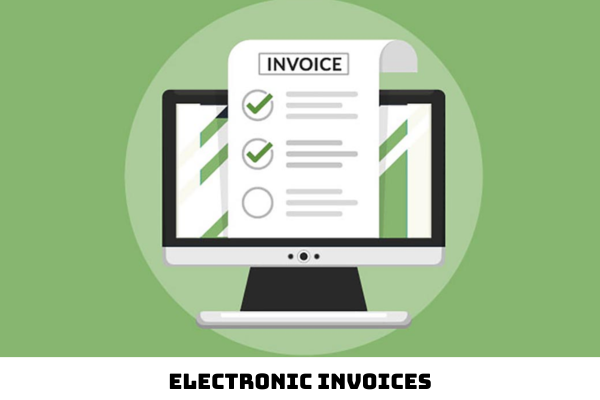Vietnam: Which symbols do electronic invoices that are not required to bear digital signatures have? What is the electronic invoice format?
Which symbols do electronic invoices that are not required to bear digital signatures in Vietnam have?
Symbols on electronic invoices specified in Clause 1, Article 4 of Circular 78/2021/TT-BTC include the following main contents:
+ Form number of an e-invoice is a digit from 1 to 6
+ Reference number of an e-invoice contains 6 characters, including letters and numbers, indicating whether the invoice bears the tax authority’s identification code or not, year of issuance, and type of e-invoice.
The contents of an electronic invoice are specified in Article 10 of Decree 123/2020/ND-CP. Accordingly, the digital signatures of the seller and buyer are one of the contents of an electronic invoice. In case the electronic invoice is not required to bear the digital signatures of the seller and the buyer, the provisions of Clause 1 of Clause14, Article 10, Decree 123/2020/ND-CP shall be complied with.
Therefore, compared with the above two regulations, electronic invoices with the following symbols will not be required to bear digital signatures:
+ An electronic invoice does not necessarily have the buyer’s digital signature, even if goods/services are sold overseas. Therefore, electronic invoices with symbols specified in Clause 1, Article 4 of Circular 78/2021/TT-BTC will not be required to bear the digital signature of the buyer. In case the buyer is a business establishment and both the buyer and the seller agree to use digital or electronic signatures on the e-invoice issued by the seller, the invoice shall bear the buyer’s and the seller’s digital or electronic signatures as agreed.
Example: “1C22TAA” - an authenticated VAT invoice issued in 2022 and registered with the tax authority. Since this is an electronic invoice, it is required to bear the buyer's digital signature
+ E-invoices issued separately by tax authorities are required to bear the digital signatures of the seller and buyer. Therefore, an electronic invoice with the letter L is required to bear the digital signatures of the seller and buyer.
For example, “1C23LBB” - an authenticated VAT invoice issued in 2023 and issued separately by the tax authority; this invoice is not required to bear the digital signatures of the seller and buyer
+ E-invoices for sale of oil and gas to non-business individuals do not necessarily bear the buyer's electronic signature; digital signature, electronic signature of the seller. Electronic invoices for the sale of oil and gas have a common number of the letter T, invoices with the letter T issued by organizations selling gasoline do not necessarily bear the digital signatures of both the buyer and the seller.
For example, “1C22TAA” – an authenticated VAT invoice issued in 2022 and registered with the tax authority. If this is an electronic invoice issued by organizations selling gasoline, it is not necessary to bear the electronic signatures of the buyer and seller.
+ E-invoices in the form of stamps, tickets, or cards do not necessarily contain the seller’s digital signature (except for those authenticated by tax authorities). The number for stamps, tickets, and cards is 5, the letter G applies to electronic stamps, tickets, or cards that are value-added invoices; the letter H applies to electronic stamps, tickets or cards that are sales invoices and K represents an electronic invoice without code.
For example, "5K23GYY" – is a stamp, ticket, and value-added card without a code made in 2023 and is a value-added invoice registered by enterprises and organizations with tax authorities. In this case, there is no need for a digital signature from the seller.
+ For electronic documents of air transport services exported through websites and e-commerce systems established according to international practices for buyers who are non-business individuals identified as electronic invoices, the invoice does not necessarily have the digital signature of the seller.
For example: "1C22TAA". If it is an electronic document of air transport services exported through the website and the e-commerce system is prepared according to international practices for buyers who are non-business individuals, it is not necessary to have the digital signature of the seller.
+ Invoices generated by cash registers connected to electronic data transfer with tax authorities are not required to have digital signatures. The letter M: Applies to electronic invoices generated from cash registers.
For example, "1C23MBB" – an authenticated VAT invoice issued in 2022 and initiated from a cash register, so it is not required to bear the digital signatures of both buyer and seller.

What is the definition of electronic invoice in Vietnam?
Based on the provisions in Clause 2, Article 3 of Decree 123/2020/ND-CP as follows:
E-invoice means an invoice, with or without the tax authority’s authentication code, in the form of electronic data, issued by the goods seller or service provider by using electronic instruments to record information on the sale of goods or service provision in accordance with regulations of the Law on accounting and the Law on taxation, including the invoices generated by POS cash registers that are digitally connected to tax authorities. To be specific:
+ Authenticated e-invoice
+ Unauthenticated e-invoice
What does the data of an electronic invoice in Vietnam include?
Pursuant to the provisions of Clause 2, Article 12 of Decree 123/2020/ND-CP, the data of an electronic invoice consists of two components: information about the transaction and the digital signature. Authenticated e-invoices shall also contain the data of the tax authority’s code.
LawNet